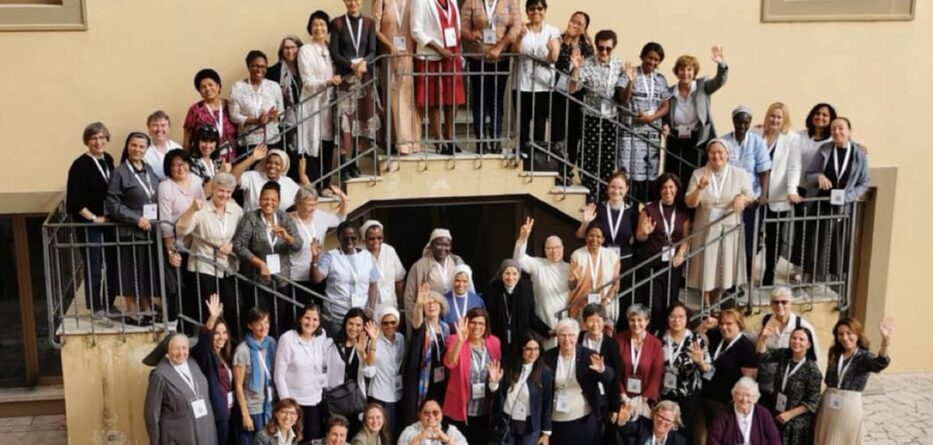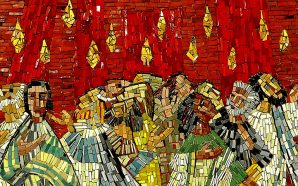Homily for the 33rd Sunday in Ordinary Time, Year A
Readings: Proverbs 31:10-13, 19-20, 30-31; Psalm 127; 1 Thessalonians 5:1-6; Matthew 25:14-30
19 November 2023
Listen at https://soundcloud.com/frank-brennan-6/homily-191123
We’re getting close to the end of the liturgical year. So we continue to focus on last things, contemplating the kingdom to come and our response to the invitation. As Dr Johnson said in the eighteenth century: ‘When a man knows he is to be hanged in a fortnight, it concentrates the mind wonderfully.’ In today’s gospel we hear the third and final of Matthew’s parables about the need to be constantly watchful. Scripture scholar Daniel Harrington says, ‘All three parables contribute to the picture of what constitutes responsible behavior in preparation for the coming of the Son of Man.’ [1] In the first parable, we contemplated the two servants – one being honest and the other dishonest. In the second parable, we met the ten bridesmaids – five being wise and the other five being foolish. In this parable, we encounter the three slaves to whom the travelling master entrusts his wealth – one receiving five talents, another receiving two talents and the last receiving only one talent. Though mind you, a talent was the equivalent of a huge amount – something like a million dollars nowadays.
The master must have made his assessment of his slaves, and it turns out to be accurate. The first who is given most gets to work and doubles the amount. The second though starting with a lesser amount does the same. But the third simply buries his talent in the ground. This third, timid and over-cautious slave has a very different perception of the master than do the other two slaves who are prepared to give anything a go. The third slave had heard that the master was ‘a hard man’, reaping where he had not sown and gathering where he had not scattered. It was this perception and the fear it engendered that caused this slave to be ever so cautious, risking nothing and therefore gaining nothing.
As it turns out, the master had decided to give away his wealth to his slaves, and he allows the first two enterprising slaves to keep the lot, including the initial capital and their earnings made during his absence. The timid and fearful slave has the little he was given taken away and given to the slave with most. Harrington raises an interesting question about this slave: ‘could he not be Matthew’s symbol for the movement within Judaism after a.d. 70 that sought to preserve the Jewish patrimony by building a “hedge” or “fence” around the Torah?’ ‘It amounts to burying the treasures of Judaism, whereas the Christian program (with its missionary activity) makes that treasure all the more fruitful and will bring about a share in the eternal joy of the Son of Man.’[2]
Or to put the parable in our contemporary Catholic context, could not the timid and fearful slave be those traditionalists at the Synod (or those cardinals submitting their dubia) who are adamant that there can be no change to Church teaching or practice on matters such as the ordination of women and recognition of the full humanity of LGBTQ persons?
During the week, Christopher White, the Vatican correspondent for the National Catholic Reporter delivered the Helder Camara lecture at Newman College with the title: ‘Will our Faith Have Children?’ He addressed that part of the Synthesis Report that states: ‘Theological and pastoral research on the access of women to the diaconate should be continued, benefiting from consideration of the results of the commissions specially established by the Holy Father, and from the theological, historical and exegetical research already undertaken. If possible, the results of this research should be presented to the next Session of the Assembly.’[3] He said there may be an opportunity during the routine papal press conference on the flight back from the forthcoming climate change conference in Dubai to ask Pope Francis about the possibility of the findings of the two commissions being released before the next session of the synod to allow open, transparent discussion of the matter. During question time, a Franciscan Missionary of Mary sister put to him not a question but a request:[4]
‘When you have that possibility to speak to Pope Francis on that papal plane about the findings of the commission on the diaconate, can you please remind him that the International Theological Commission in 1974 – we’re celebrating 50 years next year – made a finding that there was no prohibition on the ordination of women. Now 50 years, for those of us who have been in for the long haul – to find out that synodality comes up with yet another commission with more study. Not only will the faith not have children, it won’t have women. So please!’
Earlier in the week, we celebrated the requiem mass for Helena Carr, the wife of Bob Carr, longtime premier of New South Wales. Bob delivered an adoring eulogy in which he paid tribute to the Irish nuns who first taught Helena in Malaysia, and then the Sisters of Mercy who taught her at Our Lady of Mercy College, Parramatta, and then the Sister of Sacre Coeur who befriended her for life at Sancta Sophia College. Prime Minister Albanese told Parliament: ‘As a product of Catholic schooling myself, I can only imagine that some of Helena’s strength came from the nuns who taught her.’[5]
I daresay there are many women in our Church and even more young women who have received a Catholic education who are looking on at the Vatican intrigue which has kept hidden the findings of two commissions on women’s diaconate rightly thinking that these curial officials are like the slave with the one talent burying it in the ground. The kingdom will be breaking in more surely when those with talents read the signs of the times opening the Church to new possibilities, especially ensuring the dignified place of women at the table.
Reflecting on today’s parable, Scripture scholar Brendan Byrne says:
‘Some, through fear, may think they can get by simply by avoiding wrongdoing and giving back to God what they have received on a basis of strict justice (cf. the third slave) But those who appreciate God as Jesus reveals God to have the freedom to live in the creative and adventurous way that is truly appropriate (cf. the first two). They seek to carry out “what God wants”: an enterprising, even risk-taking practice of the “weightier matters of the Torah: justice mercy and faith”. Hence they stand to receive at the judgement the invitation: “Enter into the joy of your master”.’[6]
In today’s first reading we are invited to contemplate the ideal wife. At this week’s funeral Bob Carr paying tribute to his wife Helena gave thanks: ‘That she would take a punt on me, the gawky kid from Matraville with preposterous ambitions.’ He concluded: ‘H, we gifted one another that lovely last day in Vienna on October 26. At peace in a 50-year partnership. Accepting time would not be ours for ever, happy just to see the other one happy. That was where our long journey had taken us, to this calmness and wisdom. And where it ended so suddenly, cut off so cruelly. As your co-conspirator in this half century collaboration: I thank you … thank you, my lucky star … … farewell, my little friend … and flights of angels sing thee to thy rest!’
As today’s reading from Proverbs puts it:
A perfect wife – who can find her?
She is far beyond the price of pearls.
Her husband’s heart has confidence in her,
from her he will derive no little profit.
Advantage and not hurt she brings him
all the days of her life.
She is always busy with wool and with flax,
she does her work with eager hands.
She sets her hands to the distaff,
her fingers grasp the spindle.
She holds out her hand to the poor,
she opens her arms to the needy.
Charm is deceitful, and beauty empty;
the woman who is wise is the one to praise.
Give her a share in what her hands have worked for,
and let her works tell her praises at the city gates.
Let’s hope and pray that our Synod members in the year ahead will be like those first two slaves, being bold enough to take a risk and espouse the proper place of women in our contemporary church.
[1] Daniel J. Harrington, The Gospel of Matthew, Sacra Pagina Series (Collegeville, MN: Liturgical Press, 2007), p. 353.
[2] Ibid, p. 354.
[3] XVI Ordinary General Assembly of the Synod of Bishops, First Session, A Synodal Church in Mission: Synthesis Report, p. 20.
[4] See https://www.youtube.com/watch?v=6IASbnXHo88&t=1552s at 1:01:35-.
[5] See https://www.pm.gov.au/media/vale-helena-carr at 20:45-45:50. My homily is at 57:40-1:02:15.
[6] Brendan Byrne, Lifting the Burden, St Pauls, 2004, pp. 191-2.








